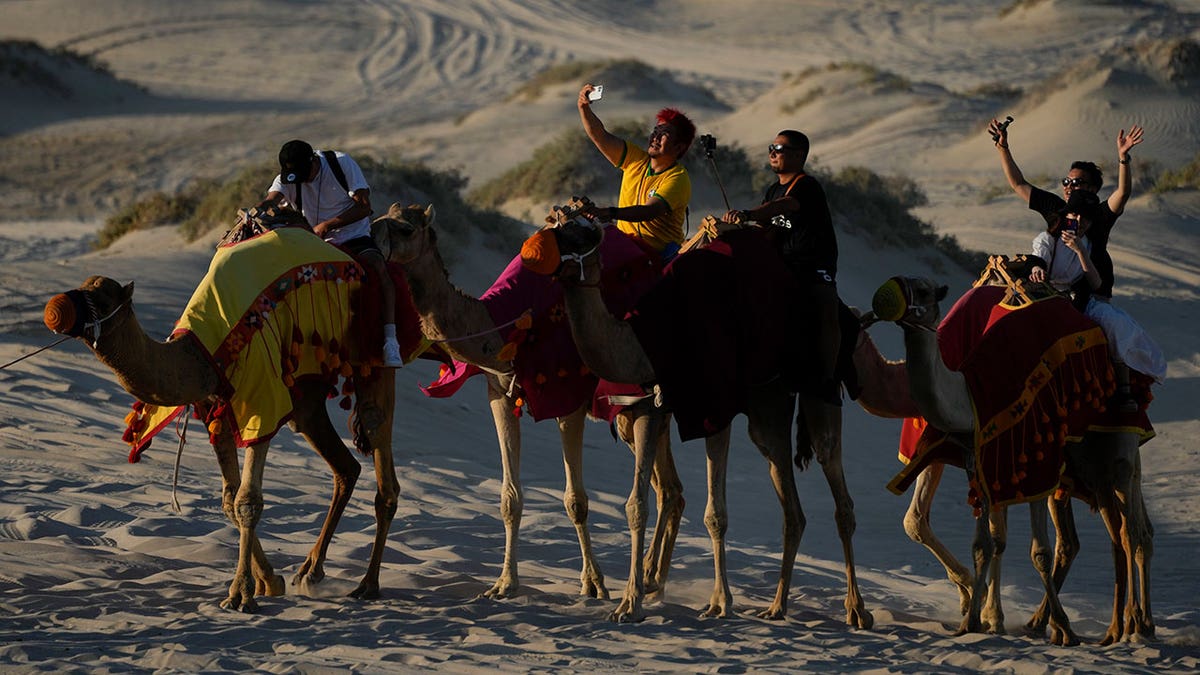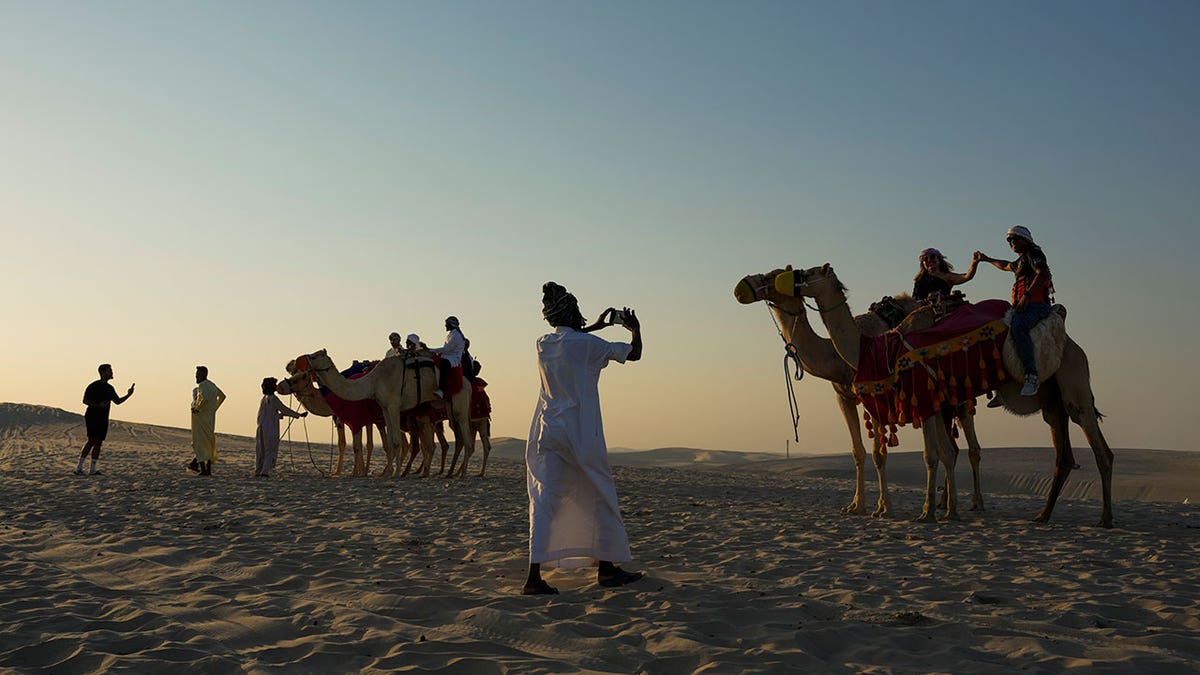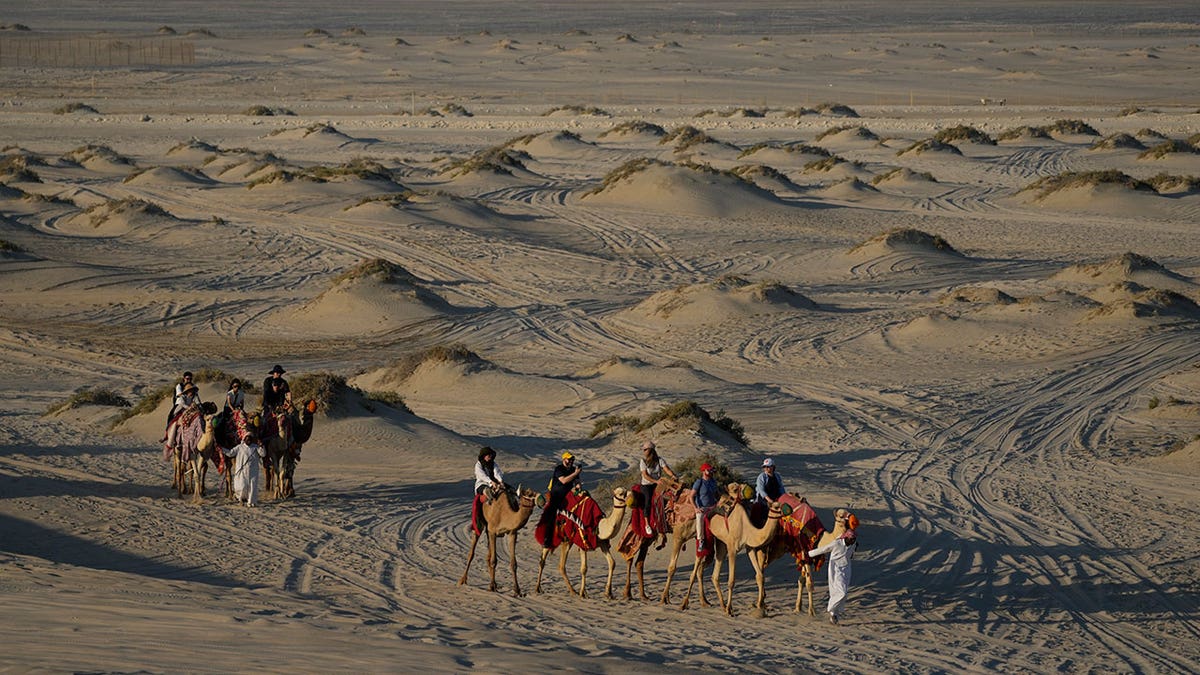Iran calling for US to be kicked out of World Cup over support for Iranian women
Masih Alinejad weighs in after the U.S. Soccer Federation spoke out in support of Iranian women's anti-government protests. She also discusses the arrest of Farideh Moradkhani, the niece of Iran's supreme leader, after she condemned the regime.
Qatar's camels have begun to take the brunt of the country's jump in tourism amid the World Cup frenzy.
Qatar has received more than 1 million tourists so far for the month-long sports event, with both Qatar and neighboring countries betting on the tourism boost. Local activities, including camel rides, have seen a jump in demand since the World Cup kicked off on Nov. 20.
Camel handlers are jumping in on the opportunity to boost business, with one particular company telling the Associated Press they have seen a rise in the number of daily camel rides, from their usual 20 on the weekdays and 50 on the weekends to 500 in the morning and another 500 in the evening during the World Cup.
"There’s a lot of money coming in," Ali Jaber al Ali, a 49-year-old Bedouin camel herder from Sudan, told the AP. "Thank God, but it’s a lot of pressure."
Al Ali told the AP his company went from having 15 camels to a total of 60. He noted that the increase in demand for camel rides has taken a physical toll on the camels as well, with less time to rest in between rides.

People take selfies while riding camels in Mesaieed, Qatar, Nov. 26, 2022. Throngs of World Cup fans in Qatar looking for something to do between games are leaving Doha for a classic Gulf tourist experience: riding a camel in the desert. But the sudden rise in tourists is putting pressure on the animals, who have almost no time to rest between each ride. (AP Photo/Ashley Landis)
Yet while business is brisk, animal rights activists aren't happy with what they see as an exploitation of the "ships of the desert."
"Whippings, beatings, injuries, and exhaustion are the norm wherever animals are forced to transport tourists, whether it’s camels carrying people in the blistering heat in Qatar or Giza, horses pulling carriages through New York City’s clogged streets, or donkeys hauling people up hundreds of steps on the Greek island of Santorini," Catie Cryar, Media Relations Manager at PETA, told Fox News Digital.

A tour guide takes a photo of a couple atop camels in Mesaieed, Qatar, Nov. 26, 2022. Throngs of World Cup fans in Qatar looking for something to do between games are leaving Doha for a classic Gulf tourist experience: riding a camel in the desert. But the sudden rise in tourists is putting pressure on the animals, who have almost no time to rest between each ride. (AP Photo/Ashley Landis)
Al Ali said a camel generally rests every five rides, with a short ride lasting around 10 minutes and longer ones ranging between 20 and 30 minutes. Now with the increase in tourists in line for a camel ride, the animals are now taking on 15 to 20 rides without a break, with some even maxing out at 40 rides.
FIFA WORLD CUP: QATAR REVERSES DECISION ON SELLING ALCOHOL IN STADIUMS 2 DAYS BEFORE GAMES BEGIN
"Now, people are saying we can’t wait ... because they have other plans they need to go to in the middle of the desert," Al Ali said.

People ride camels in Mesaieed, Qatar, Nov. 26, 2022. Throngs of World Cup fans in Qatar looking for something to do between games are leaving Doha for a classic Gulf tourist experience: riding a camel in the desert. But the sudden rise in tourists is putting pressure on the animals, who have almost no time to rest between each ride. (AP Photo/Ashley Landis)
"PETA reminds visitors to the World Cup and worldwide that there’s no retirement home for these animals, who are sent to slaughter when they’re too broken to be useful, so the best way to help them is to refuse to get taken for a ride," Cryar told Fox News Digital.
Qatar's tourism industry has seen a boom since being awarded the World Cup by FIFA and the region will continue to see a large influx of tourists with upcoming sports events, including four F1 races in 2023. Experts argue the region's increased spending on sporting events is a way to improve its image and reputation on the global stage.
CLICK HERE TO GET THE FOX NEWS APP
The Associated Press contributed to this report.











































